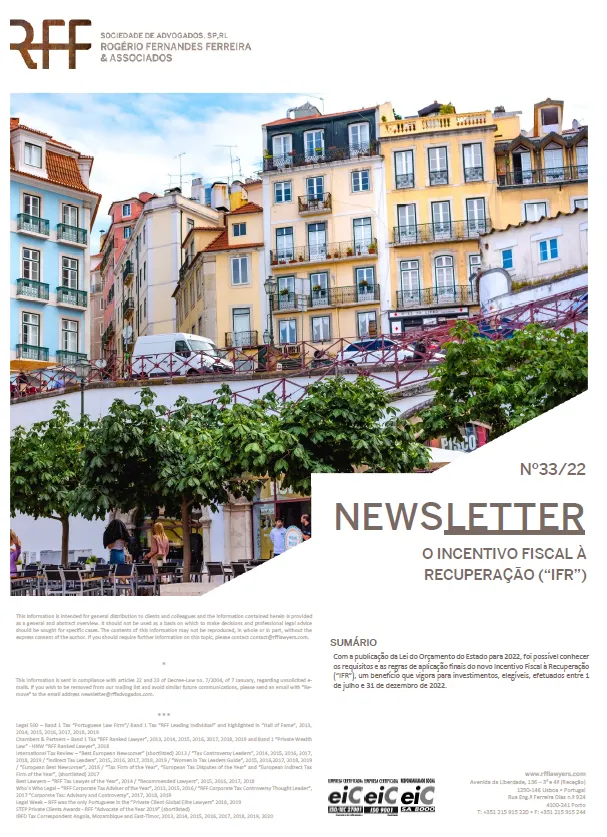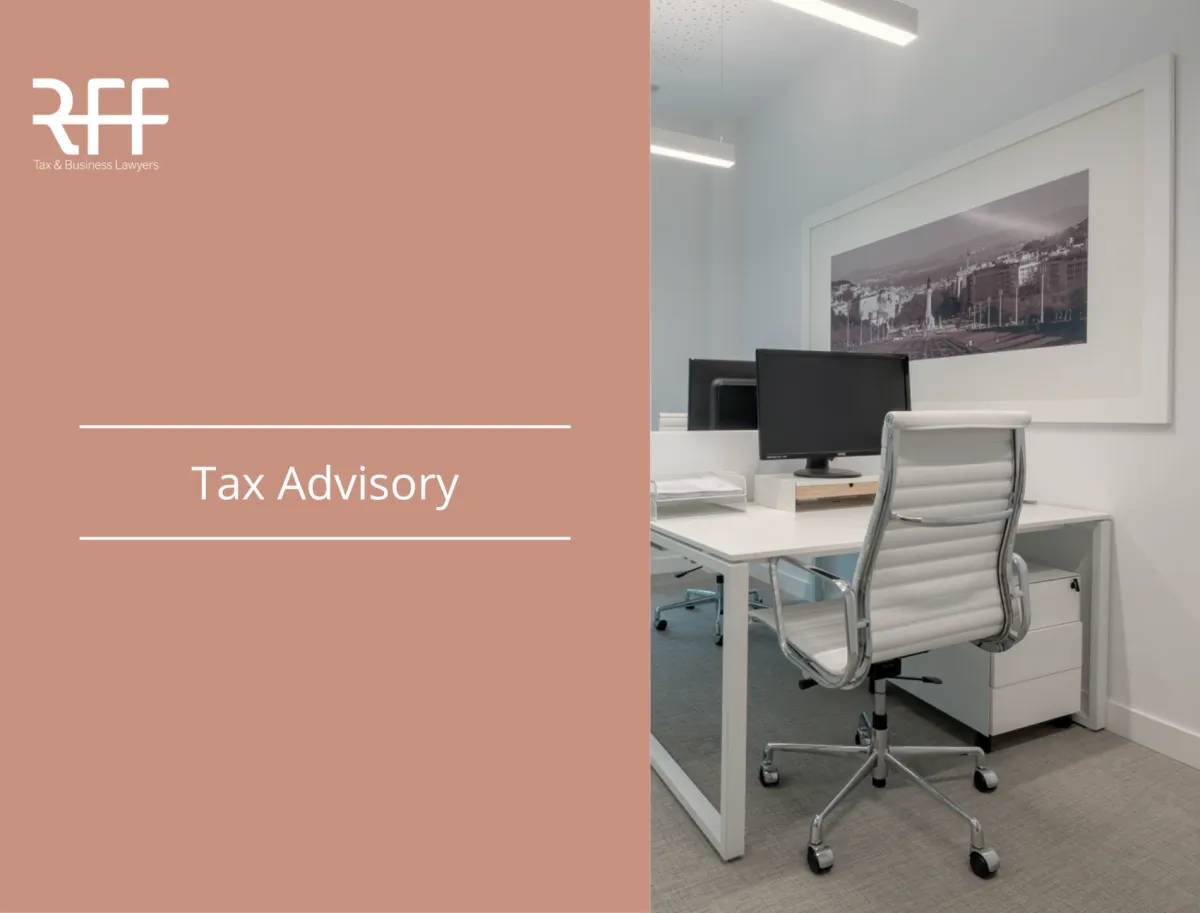The Tax Incentive to Recovery (“Incentivo Fiscal à Recuperação” or “IFR”)

The Tax Incentive to Recovery (“Incentivo Fiscal à Recuperação” or “IFR”)
SUMMARY
With the publication of the State Budget for 2022, it was possible to know the requirements and final application rules of the new tax incentive to recovery (IFR), a tax benefit in force for eligible investments made between 1 July and 31 December 2022.
INTRODUCTION
On 28 June 2022, the State Budget for 2022 was approved, which, among several measures, included the new Tax Incentive to Recovery (IFR), with the aim of supporting companies with their capitalization, innovation, treasury and simplification.
It is, therefore, a tax credit deriving from investment expenses incurred during the second half of 2022, which allows the deduction of up to 25% of the new investment expenses from the corporate income tax collection (i.e. the amount of tax to be paid).
ELIGIBLE BENEFICIARIES
Corporate Income Tax (CIT) taxpayers whose main business is of a commercial, industrial or agricultural nature are eligible for the IFR.
In parallel, the entities must comply, cumulatively, with the following conditions, to ensure their eligibility:
i. Have properly organized accounts, in accordance with the accounting standardization and other legal provisions in force for the respective activity sector;
ii. Its taxable profit must not be determined by indirect methods;
iii. To have its tax situation in order;
iv. Not to terminate employment contracts for three years, counted from the first day of the seventh month of the tax period in which the eligible investment expenses are incurred, under the modalities of collective dismissal or redundancy by termination of employment; and
v. Not distributing profits for three years, counted from the first day of the seventh month of the tax period in which the eligible investment expenses are incurred.
TAX INCENTIVES
The tax benefit to be granted to the beneficiary taxpayers corresponds to a deduction to the corporate income tax collection (i.e. the amount of tax to be paid) of the investment expenses in assets allocated to operation, made between 1 July and 31 December 2022.
Under this measure, the maximum cumulative amount of eligible investment expenses is €5,000,000 per eligible taxpayer, and the deduction is made according to the following rules:
i. 10% of the eligible expenses incurred in the tax year concerned capped at the average of the eligible investments expenses incurred in the three previous tax years;
ii. 25% of the eligible expenses incurred in the tax year concerned, in the amount that exceeds the amount mentioned in i.
The deduction foreseen under the terms previously indicated will be made in the settlement for the tax period beginning in 2022, up to 70% of the collection of this tax, depending on the relevant dates of the investments considered as eligible.
It should be noted that the amount that cannot be deducted under the terms of the previous numbers may be deducted, under the same conditions, in the five subsequent tax periods, that is, until 2027.
ELIGIBLE EXPENSES
For the purposes of the IFR, investment expenses in assets allocated to operation are those related to tangible fixed assets and non-consumable biological assets, acquired in a new state and which enter into operation or use by the end of the tax period beginning on or after 1 January 2022.
Investment expenses in intangible assets subject to depreciation, expenses with development projects and expenses with industrial property, such as patents, trademarks, permits, production processes, models or other similar rights, acquired for valuable consideration and whose exclusive use is recognized for a limited period of time, provided that they are not acquired as a result of legal acts or transactions of the beneficiary taxpayer with entities with which it is in a situation of special relations are also eligible.
As excluded investment, the applicable regime foresees expenses in land, in assets that can be used in the personal sphere (e.g. light passenger or mixed-use vehicles, recreational boats and tourist aircraft, furniture and comfort items, etc.), as well as those effected in assets allocated to activities under concession or public-private partnership agreements with public sector entities.
Under this regime, all assets underlying the eligible expenses must be owned and accounted for according to the rules that determined their eligibility for a minimum period of five years or, when less, during the respective minimum useful life.
ACCESORY OBLIGATIONS
In terms of accessory obligations, the legislator has defined, within the scope of the IFR, that the tax that ceases to be paid as a result of this deduction must be declared in the annex to the balance sheet and to the profit and loss account of taxpayers subject to CIT which are beneficiaries of the IFR.
On the other hand, the documents justifying the amount of the benefit calculated must also be included in the tax file.
It should be noted that the IFR cannot be combined, in respect of the same eligible investment expenses, with any other tax benefits of the same nature provided in other legislation.
In the event of non-compliance by taxpayers who benefit from the IFR with the above-mentioned accessory obligations, they will have to return the amount of tax which has not been paid due to the application of this benefit, plus the corresponding compensatory interest, increased by 15 percentage points.
FINAL OBSERVATIONS
In summary, the IFR intends to positively discriminate the increase of business investment, ensuring the maintenance of jobs in beneficiary companies, as well as the non-distribution of dividends for a period of three years, reinforcing the capitalisation of companies.
To this extent, this will be one of the most attractive investment tax benefits in force during the second half of 2022, constituting a direct substitute for the rules set out in the special investment tax credit scheme (“Crédito Fiscal Extraordinário de Investimento” or “CFEI II”) I and II.
***
Lisbon, August, 23, 2022
Rogério M. Fernandes Ferreira
Marta Machado de Almeida
Miriam Campos Dionísio
João Freitas Jacob
(Tax Advisory Team)
